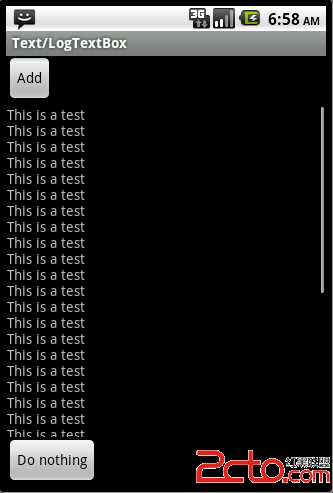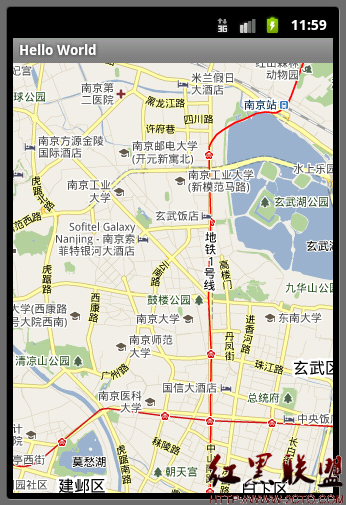从网络读取数据并动态的显示在ListView中
这两天写了个小程序,使用了从网络读取xml数据,并显示在ListView中。
这里面有几个关键点:
从网络读取数据
SAX解析xml
异步填充ListView
先看下截图:
非常简单的界面哈
为了方便,我再自己的服务器上,放了一个xml文件,其内容主要是:
<?xml version="1.0"?>
<products>
<product>
<price>100</price>
<name>android dev</name>
<image src="image/android1.png"/>
</product>
<product>
<price>100</price>
<name>androiddev2</name>
<image src="image/android1.png"/>
</product>
<!-- 接着重复下去.... -->
</products>
该程序,首先用一个AsyncTask新启一个线程,来下载和解析xml;和主线程通过Handler对象来通讯。
下载XML文件
通过HTTPGet来下载xml。这时apache提供的包,需要首先包含如下包:
import org.apache.http.HttpEntity;
import org.apache.http.HttpResponse;
import org.apache.http.HttpStatus;
import org.apache.http.client.HttpClient;
import org.apache.http.client.methods.HttpGet;
import org.apache.http.impl.client.DefaultHttpClient;
代码如下:(使用Get方法)
protected String doInBackground(String... params) {
HttpGet httpRequest = new HttpGet(params[0]); //从url 创建一个HttpGet对象
HttpClient httpclient = new DefaultHttpClient();
//mShowHtml.setText("");
try {
HttpResponse httpResponse = httpclient.execute(httpRequest);
if(httpResponse.getStatusLine().getStatusCode() == HttpStatus.SC_OK){//获取http的返回值代码
HttpEntity entitiy = httpResponse.getEntity();
InputStream in = entitiy.getContent();//获得内容
//解析xml,下面详述
InputSource source = new InputSource(in);
SAXParserFactory sax = SAXParserFactory.newInstance();
XMLReader xmlReader = sax.newSAXParser().getXMLReader();
xmlReader.setContentHandler(new ProductHandler());
xmlReader.parse(source);
}
else {
//return "请求失败!";
//mShowHtml.setText("请求失败");
//Message mymsg = mMainHandler.obtainMessage();
//mymsg.obj = "请求失败";
//mMainHandler.sendMessage(mymsg);
}
}catch(IOException e){
e.printStackTrace();
}catch(SAXException e) {
e.printStackTrace();
}catch(ParserConfigurationException e) {
e.printStackTrace();
}
return null;
}
解析XML
使用SAX的解析方法,先包含必须得包
import org.xml.sax.InputSource;
import org.xml.sax.SAXException;
import org.xml.sax.XMLReader;
import org.xml.sax.helpers.DefaultHandler;
解析的代码,正如上面所示:
//InputSource是解析源,可以通过一个InputStream创建
urce source = new InputSource(in);
SAXParserFactory sax = SAXParserFactory.newInstance();
der xmlReader = sax.newSAXParser().getXMLReader();
xmlReader.setContentHandler(new ProductHandler());//ProductHandler是解析的句柄
der.parse(source);
SAX主要使用ContentHandler接口来传递解析好得数据,不过,更经常使用的是DefaultHandler
class ProductHandler extends DefaultHandler { //从DefaultHandler继承即可
private ProductInfo curProduct;
private String content;
//解析到一个标签时调用
public void startElement(String uri, String localName, String name, org.xml.sax.Attributes attributes) throws SAXException {
if(localName.equals("product")) {//遇到product标签,进行解析
curP
补充:移动开发 , Android ,





